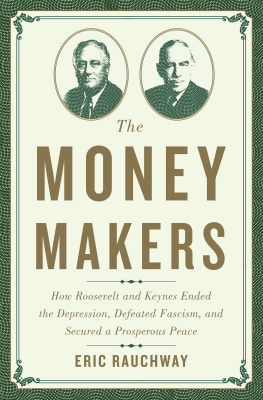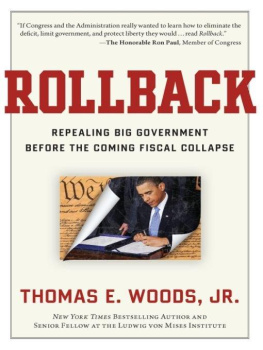Thomas E. Woods Jr. - Back on the Road to Serfdom: The Resurgence of Statism
Here you can read online Thomas E. Woods Jr. - Back on the Road to Serfdom: The Resurgence of Statism full text of the book (entire story) in english for free. Download pdf and epub, get meaning, cover and reviews about this ebook. year: 2010, publisher: Intercollegiate Studies Institute, genre: Politics. Description of the work, (preface) as well as reviews are available. Best literature library LitArk.com created for fans of good reading and offers a wide selection of genres:
Romance novel
Science fiction
Adventure
Detective
Science
History
Home and family
Prose
Art
Politics
Computer
Non-fiction
Religion
Business
Children
Humor
Choose a favorite category and find really read worthwhile books. Enjoy immersion in the world of imagination, feel the emotions of the characters or learn something new for yourself, make an fascinating discovery.

- Book:Back on the Road to Serfdom: The Resurgence of Statism
- Author:
- Publisher:Intercollegiate Studies Institute
- Genre:
- Year:2010
- Rating:3 / 5
- Favourites:Add to favourites
- Your mark:
- 60
- 1
- 2
- 3
- 4
- 5
Back on the Road to Serfdom: The Resurgence of Statism: summary, description and annotation
We offer to read an annotation, description, summary or preface (depends on what the author of the book "Back on the Road to Serfdom: The Resurgence of Statism" wrote himself). If you haven't found the necessary information about the book — write in the comments, we will try to find it.
Thomas E. Woods Jr.: author's other books
Who wrote Back on the Road to Serfdom: The Resurgence of Statism? Find out the surname, the name of the author of the book and a list of all author's works by series.
Back on the Road to Serfdom: The Resurgence of Statism — read online for free the complete book (whole text) full work
Below is the text of the book, divided by pages. System saving the place of the last page read, allows you to conveniently read the book "Back on the Road to Serfdom: The Resurgence of Statism" online for free, without having to search again every time where you left off. Put a bookmark, and you can go to the page where you finished reading at any time.
Font size:
Interval:
Bookmark:
Culture of Enterprise series
Previously published:
Human Goods, Economic Evils: A Moral Approach to the Dismal Science
Edward Hadas
Third Ways: How Bulgarian Greens, Swedish Housewives, and Beer-Swilling Englishmen Created Family-Centered Economiesand Why They Disappeared
Allan C. Carlson
A Path of Our Own: An Andean Village and Tomorrow's Economy of Values
Adam K. Webb
Econoclasts: The Rebels Who Sparked the Supply-Side Revolution and Restored American Prosperity
Brian Domitrovic
Redeeming Economics: Rediscovering the Missing Element
John D. Mueller
Toward a Truly Free Market: A Distributist Perspective on the Role of Government, Taxes, Health Care, Deficits, and More
John C. Mdaille
Seize Freedom! American Truths and Renewal in a Chaotic Age
Thaddeus G. McCotter
The Resurgence of Statism
Edited by
Thomas E. Woods Jr.

WILMINGTON, DELAWARE
Thomas E. Woods Jr.
It was not difficult to predict a major consequence of the Panic of 2008: disparaging the market economy and the free society is now more chic than it has been in half a century. In light of recent events, the argument runs, only a hopeless naf would champion these things. What we need now is greater supervision by our public servants, and less adherence to the discredited dogmas of the past.
Just how much the free market was in fact responsible for the crisis, or the extent to which government itself and its central bank may have been the culprits (and thus whether the free market could have been to blame in the first place), is the subject of one of the essays in this volume. The unifying theme of this book, though, is the brute fact that a shift toward statism is indeed occurring, and that it will not end happily. History is littered with foreign and domestic crises that became pretexts for the expansion of government power, and the present instance appears to be no exception.
When we argue that the winds are blowing in the direction of an ever-larger role of the state in American life, we must be careful not to imply that prior to 20078 a broad consensus in favor of the free market and against state coercion had taken root. Even during the 1980s, when free-market ideas were said to be sweeping the country, the net effects were modest. Larry Schwab makes a persuasive case in his overlooked study The Illusion of a Conservative Reagan Revolution that the transformation that was supposed to have overtaken America during the 1980s was rather more limited than either liberals or conservatives have been willing to admit. There is little evidence of a lasting ideological shift among the population, and government grew rather than shrank, with the federal budget doubling over the course of the decade.
The failure of conservatives to make significant inroads into the federal apparatus was symbolized by the Contract with America, the series of proposals Republicans promised to support on the eve of their off-year landslide in 1994. What was portrayed as a bold array of policy initiatives was in fact a timid and insignificant list of changes that would have left the federal apparatus for all intents and purposes unchanged. The Brookings Institution correctly observed: Viewed historically, the Contract represents the final consolidation of the bedrock domestic policies and programs of the New Deal, the Great Society, the postSecond World War defense establishment, and, most importantly, the deeply rooted national political culture that has grown up around them.
The GOP Pledge of 2010 promised to eliminate an unspecified $100 billion from the federal budget at a time of skyrocketing debt, record deficits, and a budget approaching $4 trillion. History seemed to be repeating itself.
In mid-2010, though, F. A. Hayek's 1944 book, The Road to Serfdom, soared to the number-one slot on Amazon.com; in a single week it sold, incredibly, upwards of forty thousand copies. Although not the radical libertarian tract its critics claimed at the time, it had a profound effect on many readers, who found in it an intelligent critique of central planning and its effects on individual liberty. Was it a sign of the times that interest in a book like this would suddenly be revived? Had a critical mass of the American public grown concerned that their own country faced a watershed moment in its history involving freedom and the state?
That remains to be seen.
Hayek never expected his small book to become an international sensation, or to wind up on lists of the seminal works of the classical liberal canon. Prior to the book's release, Hayek had been a professor at the London School of Economics, where he earned a reputation as one of the world's great economic theorists. His work developing the Austrian School's theory of the business cycle won him the Nobel Prize in 1974, four decades after he wrote it. His works in economics were technical and difficult for a lay audience, though, so the popular reception of The Road to Serfdom added a new dimension to his career.
The genteel Hayek dedicated his book to socialists of all partiespeople he believed were guilty of nothing more than intellectual error. He proceeded to state his case firmly but without acrimony or invective. (If anything, he may have been too accommodating, conceding that certain interventions in the economy were acceptable or even desirable.)
Some of Hayek's book can seem dated today, since few now call for state ownership of the means of production or for the kind of central economic planning to which his criticisms applya welcome development for which Hayek himself may take some share of the credit. The problems we face stem from the mixed economy, as opposed to the fully socialist ones that Hayek criticized. All over the world, the impossible promises governments have made to their populations are beginning to unravel. Millions of people have arranged their lives in the expectation of various forms of government support that will be mathematically impossible to provide.
Aggravating this problem are the demographic trends at work across the developed world, which faces an aging crisis that will strain its welfare states to the breaking point. (As Foreign Policy magazine reported, The global population of children under 5 is expected to fall by 49 million as of midcentury, while the number of people over 60 will grow by 1.2 billion.) At the very moment that some Americans are calling for a single-payer health-care system in the United States, pointing to the alleged successes of such systems in Europe, the finance ministers of those countries privately concede that of course those programs are going to implode, and that the collapse is only a matter of time.
What the rising generations across the developed world are facing is a genuine road to serfdom. They will have to work harder and longer than did their parents just to tread water, if they can find work at all in artificial economies battered by years of stimulus and misdirected resources. Retirement will seem like something out of science fiction. And to add insult to injury, they will be putting in this effort on behalf of transfer programs that are going to collapse anywaySocial Security, Medicare, pensions, and so forth.
The economic consequences of an expanded government presence in American life are of course not the only outcomes to be feared, and this volume considers a variety of them. For one thing, as the state expands, it fosters the most antisocial aspects of man's nature, particularly his urge to attain his goals with the least possible exertion. And it is much easier to acquire wealth by means of forcible redistribution by the state than by exerting oneself in the service of one's fellow man. The character of the people thus begins to change; they expect as a matter of entitlement what they once hesitated to ask for as charity. That is the fallacy in the usual statement that it would cost only $X billion to give every American who needs it this or that benefit. Once people realize the government is giving out a benefit for free, more and more people will place themselves in the condition that entitles them to the benefit, thereby making the program ever more expensive. A smaller and smaller productive base will have to strain to provide for an ever-larger supply of recipients, until the system begins to buckle and collapse.
Font size:
Interval:
Bookmark:
Similar books «Back on the Road to Serfdom: The Resurgence of Statism»
Look at similar books to Back on the Road to Serfdom: The Resurgence of Statism. We have selected literature similar in name and meaning in the hope of providing readers with more options to find new, interesting, not yet read works.
Discussion, reviews of the book Back on the Road to Serfdom: The Resurgence of Statism and just readers' own opinions. Leave your comments, write what you think about the work, its meaning or the main characters. Specify what exactly you liked and what you didn't like, and why you think so.










